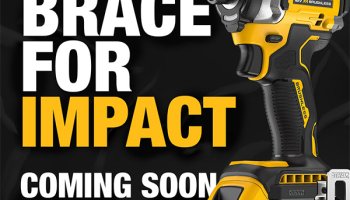
If you buy something through our links, ToolGuyd might earn an affiliate commission.
I would say that there are as many different brands of cordless power tools as there are colors in the rainbow, but there are many more than that. At the heart of each brand’s cordless systems are proprietary battery packs that are, with few exceptions, completely incompatible with other brands’ cordless tools and accessories.
The graphic above depicts 7 of the most popular cordless power tool brands on the market today – Milwaukee, Ridgid, Dewalt, Ryobi, Metabo HPT, Makita, and Bosch.
Combined, just these 7 brands alone have 19 different active Li-ion cordless tool systems, and even more if you count limited systems such as Milwaukee M4 or Dewalt 8V Max.
Tool users are eager for a brand-independent interface where the same battery pack can be used across different brands’ cordless platforms.
Are Universal Power Tool Batteries Possible?
Yes, I think so.
As many readers might be aware, you can find 3rd party battery adapters on Amazon, eBay, and other such marketplaces. In theory, a battery maker could create their own battery pack and different interface attachments that allow for cross-brand compatibility.
An independent battery system built for this purpose would be an incredibly complicated and expensive endeavor. Each brand’s interface would have to be reverse engineered, and any resulting products would also have to undergo testing and scrutiny at an independent safety laboratory such as UL.
How would the batteries be charged? Would there be physical incompatibilities depending on the adapted tools?
But this isn’t exactly what users are asking for.
Over the years, a lot of readers have expressed their desire for a standardized tool and battery connection that is adopted by all cordless power tool makers. I don’t think this is at all realistically possible, but it’s always an interesting idea to explore.
What Would be Gained?
The way I see it, universal battery compatibility comes down to two things – increased convenience (or less hassle), and the potential for reduced costs.
If a user owns tools from two or more brands, it would be great to use just one brand’s battery and charger for everything. This would save the end user money, and they could skip the hassle of having to deal with multiple chargers.
Does anyone enjoy dealing with mini USB, micro USB, Apple Lightning, USB-C, and maybe even additional electronic device charging interfaces? Of course not – the fewer, the better.
The same would be true here – most multi-platform cordless power tool users would love for a more simplified battery and charger solution.
The Benefits of Proprietary Power Tool Batteries
I shared my thoughts about the matter 6 years ago, in a post much like this one. There has been a lot of advancement in the cordless power tool industry since then, but my opinion has not changed. If you ask me, we are extremely unlikely to see a universally-compatible cordless power tool battery pack.
Why can’t tool brands simply work with each other to produce a universal battery system?
It’s about money, right? Is this about how tool brands would surely lose some revenue and profit if they weren’t guaranteed to sell high-priced batteries to users locked into a cordless system?
Let’s say that every cordless power tool brand magically updated all of their tools, batteries, and chargers to be cross-compatible with other brands’ offerings. This would be a disaster.
In my opinion, proprietary batteries are about consistent performance.
Let’s say you buy Brand A’s cordless miter saw, but you don’t like the price of their recommended batteries. Brand B’s battery packs have similar charge capacity specs, but at half the price, so you go with that one. If your brand new saw struggles to cut through a 2×6, are you going to blame the battery pack, or the tool?
Proprietary batteries allow cordless power tool brands to control the user experience.
If Brand A’s tools can only work with Brand A’s batteries, they can design new tools around the maximum power output of their highest capacity batteries, while also ensuring that the tool will still function, although usually not optimally, with their lowest capacity batteries.
Although I don’t know if it’s still true, Milwaukee’s M18 drills were said to receive a roughly 10% power boost when powered with an XC (10-cell) battery. Their drills would operate just fine with a compact battery, such as 1.5Ah, but an XC battery, such as 3.0Ah to 5.0Ah, would deliver greater power and torque. Would similar be possible if a tool couldn’t be designed around known battery characteristics and performance thresholds?
As a tool user, I would love for cross-brand compatibility. But if I were a product manager or engineer, this would be a nightmare.
It’s Complicated Enough to Choose Power Tool Batteries
Talking just about 18V/20V Max power tool batteries, here’s a list of battery sizes users can choose from today. Not every brand offers all options, but most tool brands have very broad selections.
- 5-cell standard batteries
- 5-cell high output batteries
- 10-cell standard batteries
- 10-cell high output batteries
- 15-cell standard batteries
- 15-cell high output batteries
- Stacked lithium batteries
It used to be that higher capacity batteries provided longer runtime. Now? Battery selection is much more complicated, even if you do your research.
When shopping for a car battery, you need to know the size and cold cranking amps, and the reserve capacity can be a selling point too.
If cordless power tools and batteries were suddenly cross-compatible, what else would you need to know aside from its charge capacity? Maximum continuous power output at room temperature? And how would you know how much power you needed?
I suppose that brands could provide power requirement specs for their cordless tools. But how would that be determined? Different applications, work materials, accessories, and grades of accessories can greatly affect a tool’s power consumption. Users can also influence a tool’s power requirements, such as if they apply more or less pressure, or if they wait longer to replace dull bits or blades.
A universal battery interface would require several standards to be established and strictly adhered to.
Would Same-Brand Batteries Work Better?
Makita’s XGT tools and chargers treat 3rd party batteries differently than genuine ones. I could envision brands doing the same in the context of hypothetical universally compatible batteries.
Universal compatibility would not mean universal suitability, and so tools might have to be designed to deliver lower performance for lowest-performing batteries users might have sourced from other brands.
While users might save money on less expensive batteries, they wouldn’t get the full performance of the tools they buy unless they stick with that brand’s batteries.
If a tool cannot identify the battery that is connected to it, throttling-down its performance might be a reasonable safety measure.
Would you still find a universal battery solution as appealing?
There are Too Many Obstacles
Is it wrong to wish for a universal-style cordless power tool battery? No. It’s a good thing to ask for, and I know I would surely benefit from it. But it’s not going to happen.
Cordless power tool brands do play well together when they want to. The Power Tool Institute (PTI) is a trade organization that includes the following tool brands – Black & Decker, Bosch, Dewalt, Dremel, Festool, Hilti, Metabo, Makita, Milwaukee, Rotozip, Ryobi, Stihl, and others.
But why would tool brands work together on a universal battery program when it would only complicate everything from tool design to the individual user experience?
There are simply too many obstacles and compromises that would have to be made.
What About Universal Charging?
I really thought that Bosch’s wireless charging could be the key to a universal charging solution, but it never gained traction.
Ryobi is coming out with a new USB Lithium 4V cordless tool system, and while it uses its own battery, it recharges via USB-C.
I keep thinking that a universal charging system with different interface attachments is the best we could hope for, but even that seems highly improbable. Any realistic universal charging option would be fraught with compromises.
What About Monetary Considerations?
I really don’t think that sales, revenue, or profit considerations are the major obstacle here. If corporate sales, revenue, or profit would be exactly the same, would that change anything? I don’t think so – most of the potential obstacles and negative impacts would still stand.
A long time ago, someone told me that power tool batteries are pricey because that’s their true cost. The implication was that cordless kits are heavily discounted, and so battery prices are representative of their true retail costs. I don’t know if this is true or not, but it makes sense.
Some brands do have more affordable batteries, and others tend to have aggressively discounted battery promos during certain holiday shopping seasons, but it’s hard to gauge the true cost or value of cordless batteries.
If users are free to shop around for different brands’ batteries, how would that affect the price of tools? If brands start to aggressively discount their batteries to keep users in-system, would that in turn drive up the pricing of kits or bare tools?
There are too many variables, and I don’t know enough about how brands price their batteries to do anything but guess here.
The only guarantee, I think, is that some users will seek out less expensive battery packs. If a less expensive battery fits, it might be assumed to be on-par or equivalent to that brand’s batteries, without this necessarily being true, and that could lead to mismatched power-performance issues.
Universal Batteries are Great in Theory
Is it a good idea? Absolutely, at least in theory, from the perspective of an end user.
But, I have thought things through many times over the past few years, and the idea seems impossible to implement.
If a magic wand could be waved to make it happen, would the majority of tool users be better off for it? I don’t think so.
What Would You Do?
I always try to look at this objectively, and always arrive at the same conclusion, that universal-fit cordless power tools simply aren’t a good idea. It might benefit some users, but not without the potential and even high likelihood to confuse or negatively impact many others.
I know that some of you will agree with my logical or opinions, and perhaps many of you won’t.
A popular belief is that brands wouldn’t adopt a standardized cordless interface because then they wouldn’t be able to sell expensive spare or replacement batteries to users.
Let’s say you were in charge of the entire industry, and so the net revenue or profits would be the same regardless. Would you implement a standardized or universal battery system? How?
This is where I always hit a wall. Each brand has their own distinctiveness, and the only way a standardized or universal battery system could ever work is if every brand abandoned their existing platforms and started fresh with the same baselines.
For heavier duty tools, Dewalt has FlexVolt, Milwaukee has M18 High Output, Makita has 18V X2 and XGT, Bosch has Profactor, and Metabo HPT has MultiVolt. Where’s the common denominator?
How would you satisfy users’ wishes while also ensuring that tools deliver consistent performance and user experiences regardless of battery? Would might you do – if anything – to prevent a user from choosing an underpowered or lower-spec battery with a tool with high power demands?






